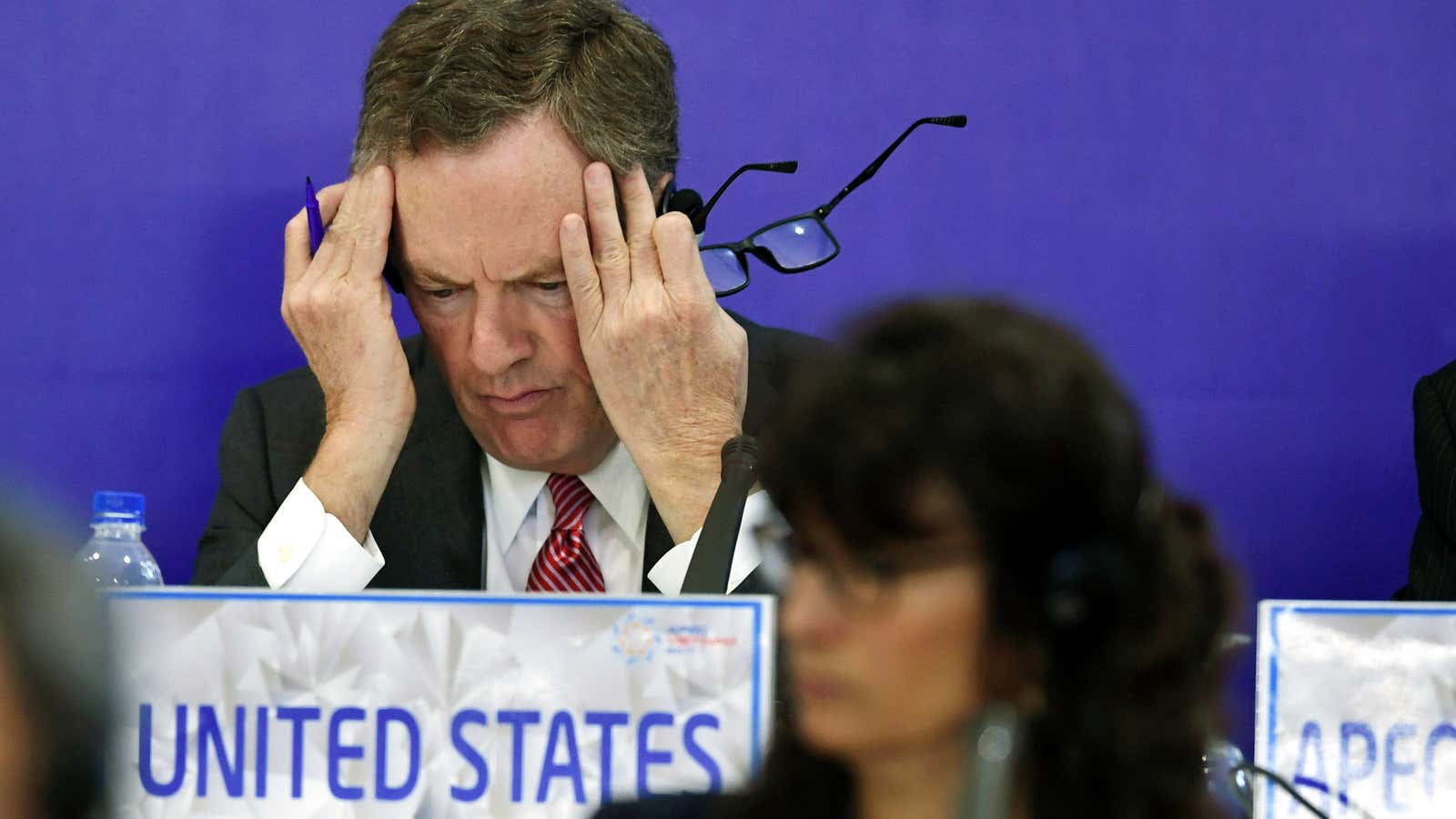The White House has started the clock. The re-negotiation of the North American Free Trade Agreement (Nafta), which underpins $1.1. trillion in trade between the US, Canada, and Mexico, will start no later than August 16. But will it be a spruce-up or a gut renovation?
When US Trade Representative Robert Lighthizer calls these trade talks (pdf) an effort at “modernization,” one pictures a contractor talking about fixing a small leak in the bathroom. But when the walls come down and the pipes are exposed, little problems can multiply. That leak turns out to be over-pressure in the water heater, which must be replaced. Now your septic tank is overflowing into the neighbor’s yard. And soon, you are enmeshed in a total, and expensive, plumbing overhaul.
US corporations are hoping we can just fix the leak with a little plumber’s tape. Today, 32 chief executives sent a letter to the White House, urging Trump to move quickly on an “update” to the trade agreement. The authors ranged from agricultural barons who sell corn unfettered by tariffs to railroad operators who move their goods across borders. These luminaries reminded Trump that some 14 million jobs are connected to Nafta trade—so let’s not disrupt the flow, please.
Judging from nearly every policy decision made by the administration so far, the White House will be sympathetic to this view. Each time Trump has encountered an opportunity to embrace his campaign populism, he has instead favored the business establishment. The latest example is a manufacturing facility owned by the Carrier company in Indiana. Last fall, Trump loudly proclaimed that he had blocked the company from moving operations to Mexico, but the move—and the associated US lay-offs—are going ahead anyway.
However, if the administration and big business are keen to make do with a quick fix, some of the other occupants of this house are eager to start ripping out drywall and putting in a jacuzzi. And the structure of the building is going to favor them.
US trade negotiators are bound by a law written for the Obama administration in 2015. These rules outline specific negotiating principles and require the dealmakers to consult with multiple congressional committees. The rules also require US negotiators to share detailed summaries of their objectives publicly 30 days before talks begin, and release the text of any agreement 30 days before it could come up for a vote.
When these hoops to jump were enacted, free-trade critics saw them mostly as a rubber stamp on the Pacific free-trade deal negotiated by the Obama administration—the TPP. Having nixed that deal, however, Trump must follow the same protocols, and and the TPP’s critics, including progressive Democrats and labor unions, now see these rules as a handy tool for measuring how well Trump adheres to the trade promises he made on the campaign to protect American workers from low-wage competition.
Given that Nafta talks start in August and the transparency rules introduce obligatory delays, the renegotiation is likely to bleed into the 2018 campaign season. That will allow Democrats in opposition to drive a wedge between Republican lawmakers, who will be facing voters demanding jobs, and Trump, who will probably be trying to please big business. For the president, this will be like trying to sell the house while replacing the plumbing—on the cheap.
Of course, all that is just on the US side. Mexico and Canada have their own ideas for what an improved deal would look like, and are unlikely to hand Trump a political victory without getting something in return. While the two countries have badly need to preserve their access to US markets, US demands on issues ranging from country-of-origin labels to international dispute resolution will require giving these leaders something to take home to voters, whether that’s protecting Canada’s dairy market or Mexico’s auto industry.
All this means an overhaul of the trade deal won’t proceed according to any single set of principles, whether beefing up labor protection or reducing market access. But trade experts say that once talks are opened, it will be far harder to find a politically palatable deal than Trump anticipates. Indeed, the talks could end without official changes at all, or in total collapse.
For the US, Nafta’s problems are small-time compared to the economic effects of trade imbalances with China or technological change. And that makes renegotiating it a high-risk, low-reward endeavor. A ramshackle attempt at DIY home improvement could easily turn into an unexpected flooding of the whole basement level.
